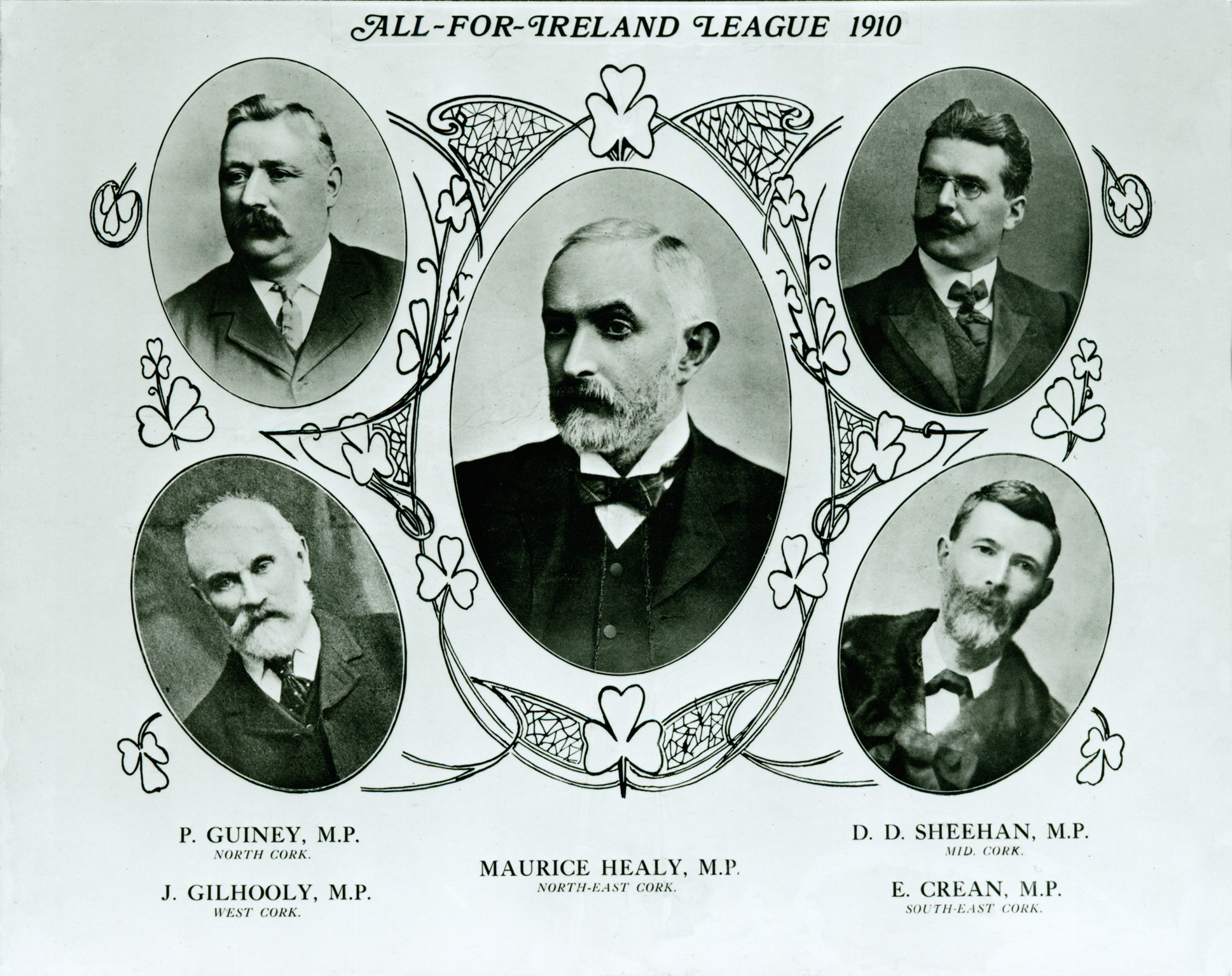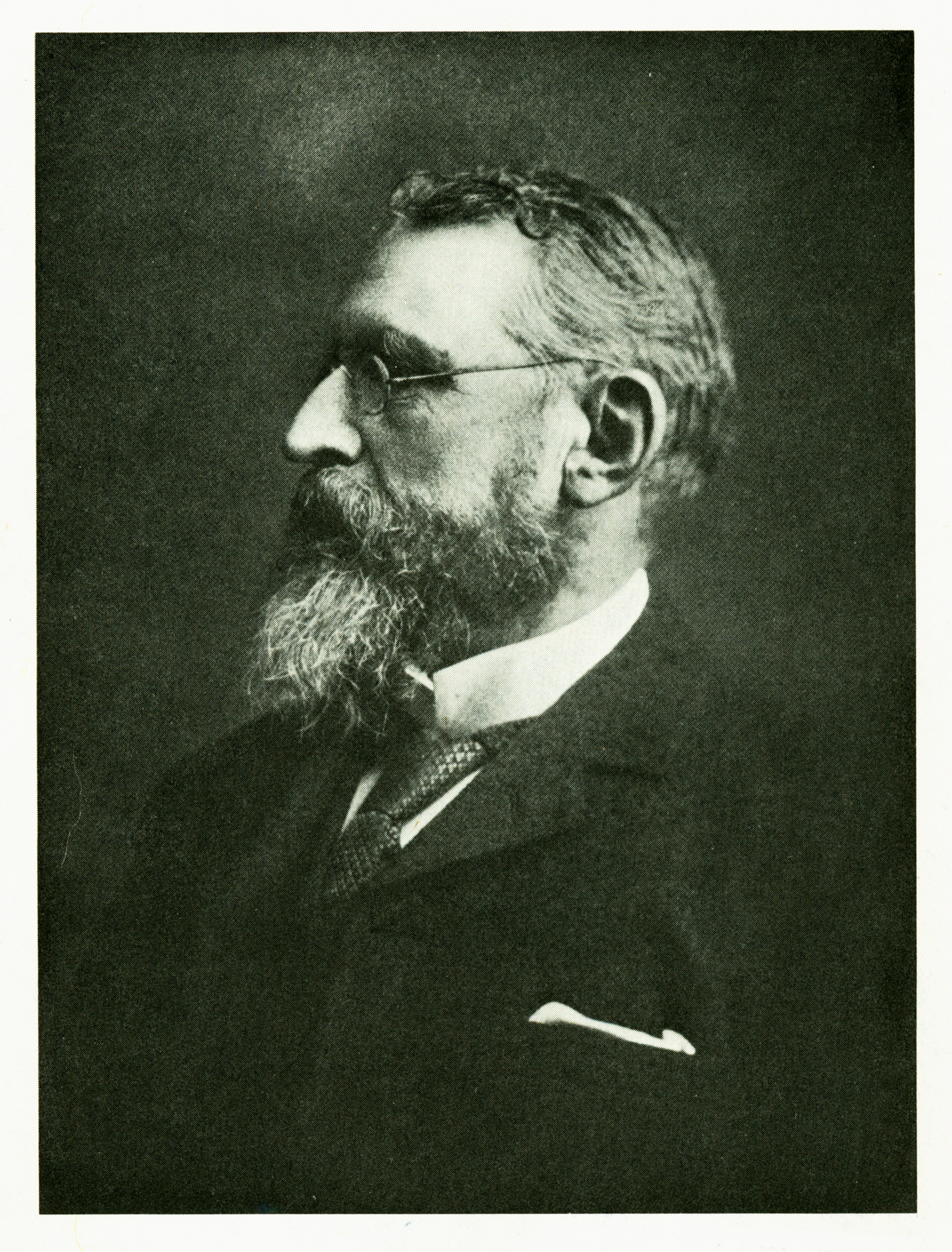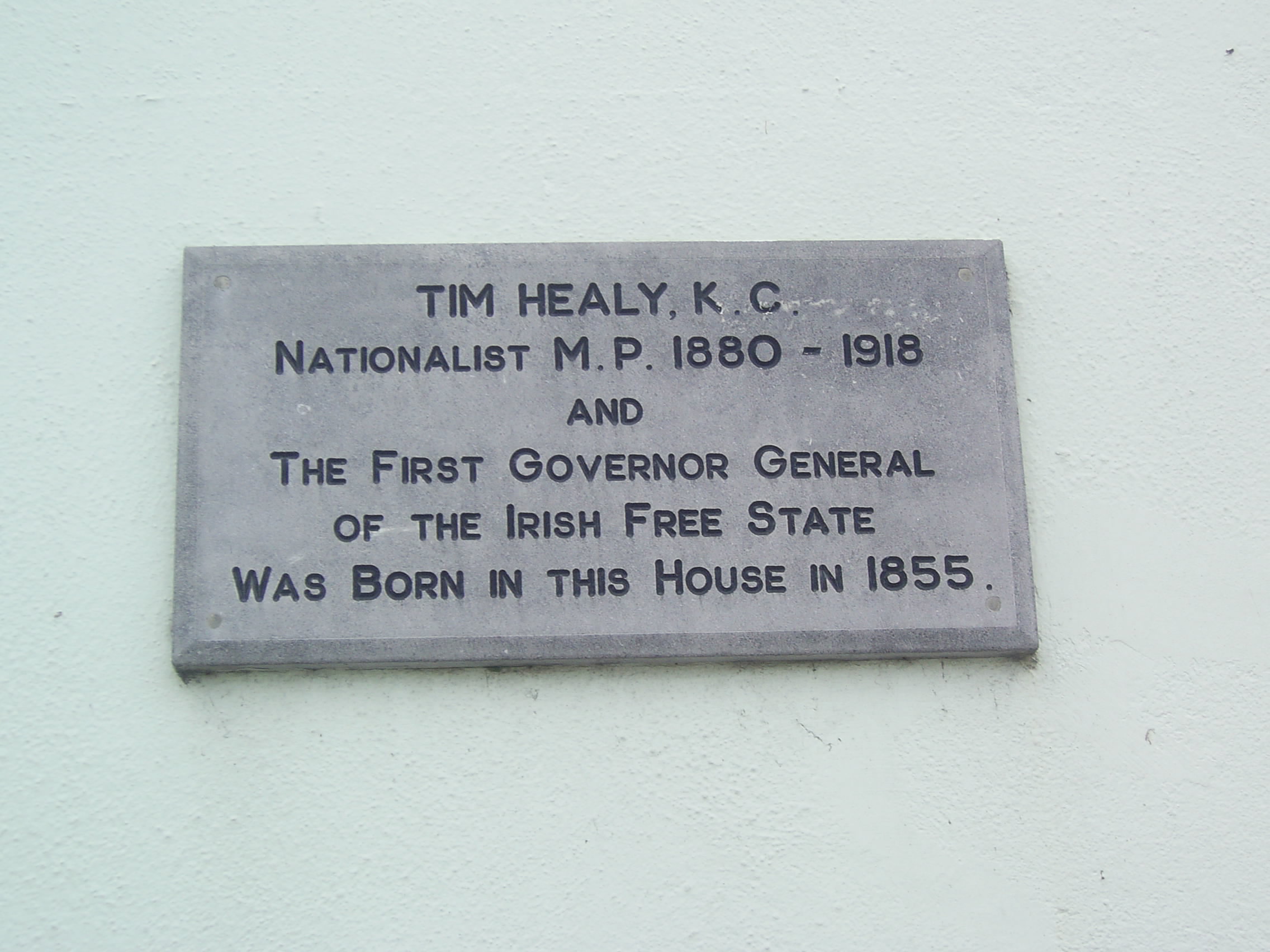|
All-for-Ireland League
The All-for-Ireland League (AFIL) was an Irish, Munster-based political party (1909–1918). Founded by William O'Brien MP, it generated a new national movement to achieve agreement between the different parties concerned on the historically difficult aim of Home Rule for the whole of Ireland. The AFIL established itself as a separate non-sectarian party in the House of Commons of the United Kingdom of Great Britain and Ireland, binding a group of independent nationalists MPs to pursue a broader concept of Irish nationalism, a consensus of political brotherhood and reconciliation among all Irishmen, primarily to win Unionist consent to an All-Ireland parliamentary settlement. Conciliation plus business O'Brien's conciliatory initiation of the 1902 Land Conference, achieved with the backing of the United Irish League (UIL) which he had founded, led to agreement on the Land Purchase (Ireland) Act 1903, which resolved Ireland's century old land question. This was followed by th ... [...More Info...] [...Related Items...] OR: [Wikipedia] [Google] [Baidu] |
William O'Brien
William O'Brien (2 October 1852 – 25 February 1928) was an Irish nationalist, journalist, agrarian agitator, social revolutionary, politician, party leader, newspaper publisher, author and Member of Parliament (MP) in the House of Commons of the United Kingdom of Great Britain and Ireland. He was particularly associated with the campaigns for land reform in Ireland during the late 19th and early 20th centuries as well as his conciliatory approach to attaining Irish Home Rule. Family, education William O'Brien was born at Bank Place in Mallow, County Cork, as second son of James O'Brien, a solicitor's clerk, and his wife Kate, the daughter of James Nagle, a local shopkeeper. On his mother's side he was descended from the distinguished Norman family of Nagles, long settled in the vicinity of Mallow giving their name to the nearby Nagle Mountains. He was also linked through his mother with the statesman Edmund Burke's mother's family, as well as with the poet Edmund Spenser's ... [...More Info...] [...Related Items...] OR: [Wikipedia] [Google] [Baidu] |
United Irish League
The United Irish League (UIL) was a nationalist political party in Ireland, launched 23 January 1898 with the motto ''"The Land for the People"''. Its objective to be achieved through agrarian agitation and land reform, compelling larger grazier farmers to surrender their lands for redistribution among the small tenant farmers. Founded and initiated at Westport, County Mayo by William O'Brien, it was supported by Michael Davitt MP, John Dillon MP, who worded its constitution, Timothy Harrington MP, John O'Connor Power MP and the Catholic clergy of the district. By 1900 it had expanded to be represented by 462 branches in twenty-five counties.O'Brien, Joseph V.: p.112 Background In 1895 William O'Brien retired from Parliament and the Irish Parliamentary Party (IPP) in the wake of the Parnell split, by which the party became fragmented into three separate networks of local organisation—the Parnellite Irish National League, the Dillionite anti-Parnellite Irish National Federati ... [...More Info...] [...Related Items...] OR: [Wikipedia] [Google] [Baidu] |
Irish Reform Association
The Irish Reform Association (1904–1905) was an attempt to introduce limited devolved self-government to Ireland by a group of reform oriented Irish unionist land owners who proposed to initially adopt something less than full Home Rule. It failed to gain acceptance due to fierce opposition from Ulster Unionists who on the one hand claimed it went too far, and on the other hand denounced by Irish Nationalists who claimed it did not go far enough. Also known as the Irish Reform Movement, it ended in calamity for most of those concerned. Background Since the 1870s a Land War had been waged incessantly by tenant farmers in Ireland against their gentry landlords mainly due to rack-renting, evictions and depressed economic conditions. The United Kingdom Government tried to alleviate tensions by introducing several Irish Land Acts which only partly relieved the situation. At the turn of the century the United Irish League, founded in 1898, intensified agrarian agitations ... [...More Info...] [...Related Items...] OR: [Wikipedia] [Google] [Baidu] |
Timothy Michael Healy
Timothy Michael Healy, KC (17 May 1855 – 26 March 1931) was an Irish nationalist politician, journalist, author, barrister and a controversial Irish Member of Parliament (MP) in the House of Commons of the United Kingdom of Great Britain and Ireland. His political career began in the 1880s under Charles Stewart Parnell's leadership of the Irish Parliamentary Party (IPP) and continued into the 1920s, when he was the first governor-general of the Irish Free State. Family background He was born in Bantry, County Cork, the second son of Maurice Healy, clerk of the Bantry Poor Law Union, and Eliza (née Sullivan) Healy. His elder brother, Thomas Healy (1854–1924), was a solicitor and Member of Parliament (MP) for North Wexford and his younger brother, Maurice Healy (1859–1923), with whom he held a lifelong close relationship, was a solicitor and MP for Cork City. His father was descended from a family line which in holding to their Catholic faith, lost their lands, whi ... [...More Info...] [...Related Items...] OR: [Wikipedia] [Google] [Baidu] |
Irish Land And Labour Association
The Irish Land and Labour Association (ILLA) was a progressive movement founded in the early 1890s in Munster, Ireland, to organise and pursue political agitation for small tenant farmers' and rural labourers' rights. Its branches also spread into Connacht. The ILLA was known under different names—Land and Labour Association (LLA) or League (LLL). Its branches were active for almost thirty years, and had considerable success in propagating labour ideals before their traditions became the basis for the new labour and trade unions movements, with which they gradually amalgamated. Background Following the early formation of the Tenant Right League in 1850, which first demanded the adoption and enforcement of the Three Fs to aid Irish tenant farmers, namely ::* fair rent; ::* fixity of tenure; ::* free sale; all of whom lacked these rights, the first ineffective Irish Land Acts of 1870, 1880 and 1881 followed. By giving priority to farming interests, the Acts severely restricted ... [...More Info...] [...Related Items...] OR: [Wikipedia] [Google] [Baidu] |
John Dillon
John Dillon (4 September 1851 – 4 August 1927) was an Irish politician from Dublin, who served as a Member of Parliament (MP) for over 35 years and was the last leader of the Irish Parliamentary Party. By political disposition Dillon was an advocate of Irish nationalism, originally a follower of Charles Stewart Parnell, supporting land reform and Irish Home Rule. Early life John Dillon was born in Blackrock, Dublin, a son of the former "Young Irelander" John Blake Dillon (1814–1866). Following the premature death of both his parents, he was partly raised by his father's niece, Anne Deane. He was educated at Catholic University School, at Trinity College Dublin and at the Catholic University of Louvain in Belgium. He afterwards studied medicine at the Royal College of Surgeons in Dublin, then ceased active involvement in medicine after he joined Isaac Butt's Home Rule League in 1873, winning notice in 1879 when he attacked Butt's weak parliamentary handling of Irish Home Rule ... [...More Info...] [...Related Items...] OR: [Wikipedia] [Google] [Baidu] |
Irish Parliamentary Party
The Irish Parliamentary Party (IPP; commonly called the Irish Party or the Home Rule Party) was formed in 1874 by Isaac Butt, the leader of the Nationalist Party, replacing the Home Rule League, as official parliamentary party for Irish nationalist Members of Parliament (MPs) elected to the House of Commons at Westminster within the United Kingdom of Great Britain and Ireland up until 1918. Its central objectives were legislative independence for Ireland and land reform. Its constitutional movement was instrumental in laying the groundwork for Irish self-government through three Irish Home Rule bills. Origins The IPP evolved out of the Home Rule League which Isaac Butt founded after he defected from the Irish Conservative Party in 1873. The League sought to gain a limited form of freedom from Britain in order to manage Irish domestic affairs in the interest of the Protestant landlord class. It was inspired by the 1868 election of William Ewart Gladstone and his Liberal Party unde ... [...More Info...] [...Related Items...] OR: [Wikipedia] [Google] [Baidu] |
Rome Rule
"Rome Rule" was a term used by Irish unionists to describe their belief that with the passage of a Home Rule Bill, the Roman Catholic Church would gain political power over their interests in Ireland. The slogan was popularised by the Radical MP and Quaker John Bright during the first Home Rule crisis in the late 19th century and continued to be used in the early 20th century. Background The term has been documented as used in the House of Commons as early as 12 July 1871.The Times; ''Parliamentary Intelligence. House of Commons, Wednesday, 12 July''; 13 July 1871; pg6 col F The Local and Personal Act bill had been proposed by Denis Caulfield Heron, MP for Tipperary. The Nationalist MP for Westmeath, Patrick James Smyth, rose to second the Bill and used his speech to advocate repeal of the Union. In reply John Vance, the Unionist MP for Dublin City, stated: "The constituents of the honourable member for Westmeath would not be satisfied with the homoeopathic dose of 'home r ... [...More Info...] [...Related Items...] OR: [Wikipedia] [Google] [Baidu] |
Ulster
Ulster (; ga, Ulaidh or ''Cúige Uladh'' ; sco, label= Ulster Scots, Ulstèr or ''Ulster'') is one of the four traditional Irish provinces. It is made up of nine counties: six of these constitute Northern Ireland (a part of the United Kingdom); the remaining three are in the Republic of Ireland. It is the second-largest (after Munster) and second-most populous (after Leinster) of Ireland's four traditional provinces, with Belfast being its biggest city. Unlike the other provinces, Ulster has a high percentage of Protestants, making up almost half of its population. English is the main language and Ulster English the main dialect. A minority also speak Irish, and there are Gaeltachtaí (Irish-speaking regions) in southern County Londonderry, the Gaeltacht Quarter, Belfast, and in County Donegal; collectively, these three regions are home to a quarter of the total Gaeltacht population of Ireland. Ulster-Scots is also spoken. Lough Neagh, in the east, is the largest lake i ... [...More Info...] [...Related Items...] OR: [Wikipedia] [Google] [Baidu] |
Irish Home Rule Movement
The Irish Home Rule movement was a movement that campaigned for self-government (or "home rule") for Ireland within the United Kingdom of Great Britain and Ireland. It was the dominant political movement of Irish nationalism from 1870 to the end of World War I. Isaac Butt founded the Home Government Association in 1870. This was succeeded in 1873 by the Home Rule League, and in 1882 by the Irish Parliamentary Party. These organisations campaigned for home rule in the British House of Commons. Under the leadership of Charles Stewart Parnell, the movement came close to success when the Liberal government of William Ewart Gladstone introduced the First Home Rule Bill in 1886, but the bill was defeated in the House of Commons after a split in the Liberal Party. After Parnell's death, Gladstone introduced the Second Home Rule Bill in 1893; it passed the Commons but was defeated in the House of Lords. After the removal of the Lords' veto in 1911, the Third Home Rule Bill was introd ... [...More Info...] [...Related Items...] OR: [Wikipedia] [Google] [Baidu] |
Unionism In Ireland
Unionism is a political tradition on the island of Ireland that favours political union with Great Britain and professes loyalty to the United Kingdom, British Monarchy of the United Kingdom, Crown and Constitution of the United Kingdom, constitution. As the overwhelming sentiment of Ireland's Protestantism in Ireland, Protestant minority, following Catholic Emancipation (1829) unionism mobilised to keep Ireland part of the United Kingdom of Great Britain and Ireland, United Kingdom and to defeat the efforts of Irish nationalism, Irish nationalists to restore a separate Parliament of Ireland, Irish parliament. Since Partition of Ireland, Partition (1921), as Ulster Unionism its goal has been to maintain Northern Ireland as part of the United Kingdom and to resist a transfer of sovereignty to an United Ireland, all-Ireland republic. Within the framework of a Good Friday Agreement, 1998 peace settlement, unionists in Northern Ireland have had to accommodate Irish nationalists in ... [...More Info...] [...Related Items...] OR: [Wikipedia] [Google] [Baidu] |
Church Of Ireland
The Church of Ireland ( ga, Eaglais na hÉireann, ; sco, label= Ulster-Scots, Kirk o Airlann, ) is a Christian church in Ireland and an autonomous province of the Anglican Communion. It is organised on an all-Ireland basis and is the second largest Christian church on the island after the Roman Catholic Church. Like other Anglican churches, it has retained elements of pre-Reformation practice, notably its episcopal polity, while rejecting the primacy of the Pope. In theological and liturgical matters, it incorporates many principles of the Reformation, particularly those of the English Reformation, but self-identifies as being both Reformed and Catholic, in that it sees itself as the inheritor of a continuous tradition going back to the founding of Christianity in Ireland. As with other members of the global Anglican communion, individual parishes accommodate different approaches to the level of ritual and formality, variously referred to as High and Low Church. Overvie ... [...More Info...] [...Related Items...] OR: [Wikipedia] [Google] [Baidu] |








